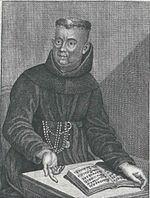Marko Pohlin, Date of Birth, Place of Birth, Date of Death
TweetMarko Pohlin
Slovenian linguist
 Date of Birth: 13-Apr-1735
Date of Birth: 13-Apr-1735
 Place of Birth: Ljubljana, Ljubljana City Municipality, Slovenia
Place of Birth: Ljubljana, Ljubljana City Municipality, Slovenia
Date of Death: 04-Feb-1801
Profession: poet, Catholic priest, translator, monk, linguist
Zodiac Sign: Aries 
About Marko Pohlin
- Marko Pohlin (13 April 1735 – 4 February 1801), was a Slovene philologist and author.
- He is generally considered the first exponent of the Age of Enlightenment in the Slovene Lands. He was born Anton Pohlin in Ljubljana, in what was then the Duchy of Carniola in the Habsburg Monarchy, as the son of a tavern owner.
- He studied in Jesuit colleges in Novo Mesto and Ljubljana, and joined the Augustinian order. He is best known for his book Kraynska grammatica (Carniolan Grammar), a grammar of Slovene written in German.
- In it, Pohlin attempted to modernize Adam Bohoric's sixteenth-century grammar.
- The work is especially important for its preface, in which Pohlin praised Slovene and rejected those that regarded it as rough and unworthy of being used in literature.
- Pohlin also composed a Slovene-German-Latin dictionary entitled Tu malu besedishe treh jesikov (Small Trilingual Dictionary) or Dictionarium slavicum carniolicum (Slavic-Carniolan Dictionary).
- In 1779, he published the first issue of Pisanice (Writings), an almanac of popular songs from Carniola and Carinthia. Pohlin was also the author of the book Kraynske kroneke (The Carniolan Chronicles, 1770), which is considered the first work of historiography written in Slovene.
- In his monograph, republished and enlarged in 1788, Pohlin took as a source the Dalmatian humanist historian Mauro Orbini, who saw the Slavs as the most ancient people in Europe.
- Pohlin's historiographic work is considered of little worth but it was important in boosting the ethnic consciousness of his contemporary countymen. Although Pohlin's linguistic innovations were later rejected by his successors, his Kraynska grammatika marked the beginning of the revival of Slovene language and culture, which was later continued in Zois' circle. He died in the monastery of Mariabrunn near Vienna.
Read more at Wikipedia
See Also
- Famous People's Birthdays on 13 April, Slovenia
- Famous People's Birthdays in April, Slovenia
- Famous poet's Birthdays on 13 April, Slovenia
- Famous poet's Birthdays in April, Slovenia
- Famous Catholic priest's Birthdays on 13 April, Slovenia
- Famous Catholic priest's Birthdays in April, Slovenia
- Famous translator's Birthdays on 13 April, Slovenia
- Famous translator's Birthdays in April, Slovenia
- Famous monk's Birthdays on 13 April, Slovenia
- Famous monk's Birthdays in April, Slovenia
- Famous linguist's Birthdays on 13 April, Slovenia
- Famous linguist's Birthdays in April, Slovenia


